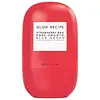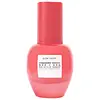What's inside
What's inside
 Key Ingredients
Key Ingredients

 Benefits
Benefits

 Concerns
Concerns

 Ingredients Side-by-side
Ingredients Side-by-side

Water
Skin ConditioningTapioca Starch
Isopentyldiol
HumectantNylon-12
C9-12 Alkane
SolventDistarch Phosphate
AbsorbentAmmonium Acryloyldimethyltaurate/Vp Copolymer
Saccharide Isomerate
HumectantFragaria Vesca Leaf Extract
AstringentSalicylic Acid
MaskingSalix Alba Bark Extract
AstringentFragaria Vesca Fruit Extract
AstringentLeuconostoc/Radish Root Ferment Filtrate
AntimicrobialSodium Hyaluronate
HumectantBisabolol
MaskingCoco-Caprylate/Caprate
EmollientTriheptanoin
Skin ConditioningButylene Glycol
HumectantPentylene Glycol
Skin ConditioningPropanediol
SolventCaprylyl Glycol
EmollientPolyglyceryl-10 Dioleate
EmulsifyingDilinoleic Acid/Butanediol Copolymer
Polyglyceryl-10 Dipalmitate
EmollientEthylhexylglycerin
Skin ConditioningSodium Hydroxide
Buffering1,2-Hexanediol
Skin ConditioningPhenoxyethanol
PreservativeCastor Oil/Ipdi Copolymer
Citric Acid
BufferingParfum
MaskingWater, Tapioca Starch, Isopentyldiol, Nylon-12, C9-12 Alkane, Distarch Phosphate, Ammonium Acryloyldimethyltaurate/Vp Copolymer, Saccharide Isomerate, Fragaria Vesca Leaf Extract, Salicylic Acid, Salix Alba Bark Extract, Fragaria Vesca Fruit Extract, Leuconostoc/Radish Root Ferment Filtrate, Sodium Hyaluronate, Bisabolol, Coco-Caprylate/Caprate, Triheptanoin, Butylene Glycol, Pentylene Glycol, Propanediol, Caprylyl Glycol, Polyglyceryl-10 Dioleate, Dilinoleic Acid/Butanediol Copolymer, Polyglyceryl-10 Dipalmitate, Ethylhexylglycerin, Sodium Hydroxide, 1,2-Hexanediol, Phenoxyethanol, Castor Oil/Ipdi Copolymer, Citric Acid, Parfum
Water
Skin ConditioningMethylpropanediol
SolventC9-12 Alkane
SolventFragaria Vesca Fruit Extract
AstringentHydroxypropyl Starch Phosphate
Salicylic Acid
MaskingPentylene Glycol
Skin ConditioningMandelic Acid
AntimicrobialSuccinic Acid
BufferingFragaria Vesca Leaf Extract
AstringentAzelaic Acid
BufferingAllantoin
Skin ConditioningSodium Hyaluronate
HumectantBisabolol
MaskingOpuntia Ficus-Indica Flower Extract
Skin ConditioningNiacinamide
SmoothingGlucosamine
Zingiber Officinale Root Extract
MaskingSaccharomyces Ferment
Skin ConditioningDextrin
AbsorbentPolydextrose
Humectant1,2-Hexanediol
Skin ConditioningCaprylyl Glycol
EmollientCoco-Caprylate/Caprate
EmollientHydroxyacetophenone
AntioxidantAmylopectin
Butylene Glycol
HumectantSuccinoglycan
Skin ConditioningLeuconostoc/Radish Root Ferment Filtrate
AntimicrobialLauroyl Lysine
Skin ConditioningSodium Phytate
Lecithin
EmollientAminomethyl Propanol
BufferingXanthan Gum
EmulsifyingCitric Acid
BufferingParfum
MaskingWater, Methylpropanediol, C9-12 Alkane, Fragaria Vesca Fruit Extract, Hydroxypropyl Starch Phosphate, Salicylic Acid, Pentylene Glycol, Mandelic Acid, Succinic Acid, Fragaria Vesca Leaf Extract, Azelaic Acid, Allantoin, Sodium Hyaluronate, Bisabolol, Opuntia Ficus-Indica Flower Extract, Niacinamide, Glucosamine, Zingiber Officinale Root Extract, Saccharomyces Ferment, Dextrin, Polydextrose, 1,2-Hexanediol, Caprylyl Glycol, Coco-Caprylate/Caprate, Hydroxyacetophenone, Amylopectin, Butylene Glycol, Succinoglycan, Leuconostoc/Radish Root Ferment Filtrate, Lauroyl Lysine, Sodium Phytate, Lecithin, Aminomethyl Propanol, Xanthan Gum, Citric Acid, Parfum
 Reviews
Reviews

Ingredients Explained
These ingredients are found in both products.
Ingredients higher up in an ingredient list are typically present in a larger amount.
1,2-Hexanediol is a synthetic liquid and another multi-functional powerhouse.
It is a:
- Humectant, drawing moisture into the skin
- Emollient, helping to soften skin
- Solvent, dispersing and stabilizing formulas
- Preservative booster, enhancing the antimicrobial activity of other preservatives
Bisabolol is famous for its skin soothing properties. It does this by blocking inflammatory signals, helping to reduce your body's reaction to irritation.
This ingredient also interferes with the process of hyperpigmentation. This can help with reducing dark spots and uneven tone.
Bisabolol is an antioxidant. Antioxidants help fight free-radicals. Free-radicals are molecules that may damage your skin cells. By fighting these free-radicals, Bisabolol may slow down signs of aging.
Studies have shown Bisabolol to have antimicrobial properties and may be a fungicide. These properties help preserve a product's shelf life.
All these properties makes bisabolol a great skin barrier helper ingredient.
Bisabolol also helps the absorption of other ingredients.
Note: Synthetic Bisabolol has been shown to be less effective.
Learn more about BisabololButylene Glycol (or BG) is used within cosmetic products for a few different reasons:
Overall, Butylene Glycol is a safe and well-rounded ingredient that works well with other ingredients.
Though this ingredient works well with most skin types, some people with sensitive skin may experience a reaction such as allergic rashes, closed comedones, or itchiness.
Learn more about Butylene GlycolC9-12 Alkane is synethically created using alkanes, or paraffins. It is added to products as a solvent. This means its main purpose is to help dissolve ingredients and create even texture.
Caprylyl Glycol is a humectant and emollient, meaning it attracts and preserves moisture.
It is a common ingredient in many products, especially those designed to hydrate skin. The primary benefits are retaining moisture, skin softening, and promoting a healthy skin barrier.
Though Caprylyl Glycol is an alcohol derived from fatty acids, it is not the kind that can dry out skin.
This ingredient is also used as a preservative to extend the life of products. It has slight antimicrobial properties.
Learn more about Caprylyl GlycolCitric Acid is an alpha hydroxy acid (AHA) naturally found in citrus fruits like oranges, lemons, and limes.
Like other AHAs, citric acid can exfoliate skin by breaking down the bonds that hold dead skin cells together. This helps reveal smoother and brighter skin underneath.
However, this exfoliating effect only happens at high concentrations (20%) which can be hard to find in cosmetic products.
Due to this, citric acid is usually included in small amounts as a pH adjuster. This helps keep products slightly more acidic and compatible with skin's natural pH.
In skincare formulas, citric acid can:
While it can provide some skin benefits, research shows lactic acid and glycolic acid are generally more effective and less irritating exfoliants.
Most citric acid used in skincare today is made by fermenting sugars (usually from molasses). This synthetic version is identical to the natural citrus form but easier to stabilize and use in formulations.
Read more about some other popular AHA's here:
Learn more about Citric AcidCoco-Caprylate/Caprate is created from fatty coconut alcohol, caprylic acid, and capric acid.
It is a lightweight emollient. Emollients create a thin barrier on the skin to trap moisture in. This helps keep your skin hydrated and soft.
Once applied, Coco-Caprylate/Caprate is absorbed quickly and leaves a silky feel.
Coco-Caprylate/Caprate may not be fungal acne safe.
Learn more about Coco-Caprylate/CaprateFragaria Vesca Fruit Extract comes from the wild or European strawberry.
Strawberries have antioxidant and moisturizing properties. They contain many compounds that are potent antioxidants, such as anthocyanins and Vitamin C.
Strawberries also contain ellagic acid, a compound that may protect our skin against UVB damage.
As an astringent, the wild strawberry helps tighten and clean out pores by drawing water out.
Learn more about Fragaria Vesca Fruit ExtractFragaria Vesca Leaf Extract comes from the leaves of the wild strawberry plant.
Strawberry leaves contain antioxidants. Antioxidants may help protect our skin against damage and the signs of aging.
Leuconostoc/Radish Root Ferment Filtrate is a natural preservative. It comes from fermenting radish roots with a bacteria called leuconostoc.
Leuconostoc comes from lactic acid.
This ingredient has antimicrobial properties and helps prevent the growth of bacteria in a product.
Leuconostoc is used to make the traditional Korean side-dish, kimchi. It is also used to make sourdough bread (both incredibly yummy foods).
Learn more about Leuconostoc/Radish Root Ferment FiltrateParfum is a catch-all term for an ingredient or more that is used to give a scent to products.
Also called "fragrance", this ingredient can be a blend of hundreds of chemicals or plant oils. This means every product with "fragrance" or "parfum" in the ingredients list is a different mixture.
For instance, Habanolide is a proprietary trade name for a specific aroma chemical. When used as a fragrance ingredient in cosmetics, most aroma chemicals fall under the broad labeling category of “FRAGRANCE” or “PARFUM” according to EU and US regulations.
The term 'parfum' or 'fragrance' is not regulated in many countries. In many cases, it is up to the brand to define this term.
For instance, many brands choose to label themselves as "fragrance-free" because they are not using synthetic fragrances. However, their products may still contain ingredients such as essential oils that are considered a fragrance by INCI standards.
One example is Calendula flower extract. Calendula is an essential oil that still imparts a scent or 'fragrance'.
Depending on the blend, the ingredients in the mixture can cause allergies and sensitivities on the skin. Some ingredients that are known EU allergens include linalool and citronellol.
Parfum can also be used to mask or cover an unpleasant scent.
The bottom line is: not all fragrances/parfum/ingredients are created equally. If you are worried about fragrances, we recommend taking a closer look at an ingredient. And of course, we always recommend speaking with a professional.
Learn more about ParfumPentylene glycol is typically used within a product to thicken it. It also adds a smooth, soft, and moisturizing feel to the product. It is naturally found in plants such as sugar beets.
The hydrophilic trait of Pentylene Glycol makes it a humectant. As a humectant, Pentylene Glycol helps draw moisture from the air to your skin. This can help keep your skin hydrated.
This property also makes Pentylene Glycol a great texture enhancer. It can also help thicken or stabilize a product.
Pentylene Glycol also acts as a mild preservative and helps to keep a product microbe-free.
Some people may experience mild eye and skin irritation from Pentylene Glycol. We always recommend speaking with a professional about using this ingredient in your routine.
Pentylene Glycol has a low molecular weight and is part of the 1,2-glycol family.
Learn more about Pentylene GlycolSalicylic Acid (also known as beta hydroxy acid or BHA) is a well-known ingredient for treating skin that struggles with acne and clogged pores. It exfoliates both the skin's surface and deep within the pores to help clear out buildup, control oil, and reduce inflammation.
Unlike AHAs (alpha hydroxy acids), salicylic acid is oil-soluble. This allows it to penetrate into pores which makes it especially effective for treating blackheads and preventing future breakouts.
Salicylic acid is also known for its soothing properties. It has a similar structure to aspirin and can calm inflamed or irritated skin, making it a good option for acne-prone skin that is also sensitive.
Concentrations of 0.5-2% are recognized by the U.S. FDA as an over-the-counter topical acne product.
It can cause irritation and/or dryness if one's skin already has a compromised moisture barrier, so it's best to focus on repairing that before introducing this ingredient into your routine.
While salicylic acid does not increase sun sensitivity, it’s still important to wear sunscreen daily to protect your skin.
If you are looking for the ingredient called BHA or Butylated Hydroxyanisole, click here.
Learn more about Salicylic AcidSodium Hyaluronate is hyaluronic acid's salt form. It is commonly derived from the sodium salt of hyaluronic acid.
Like hyaluronic acid, it is great at holding water and acts as a humectant. This makes it a great skin hydrating ingredient.
Sodium Hyaluronate is naturally occurring in our bodies and is mostly found in eye fluid and joints.
These are some other common types of Hyaluronic Acid:
Learn more about Sodium HyaluronateWater. It's the most common cosmetic ingredient of all. You'll usually see it at the top of ingredient lists, meaning that it makes up the largest part of the product.
So why is it so popular? Water most often acts as a solvent - this means that it helps dissolve other ingredients into the formulation.
You'll also recognize water as that liquid we all need to stay alive. If you see this, drink a glass of water. Stay hydrated!
Learn more about Water